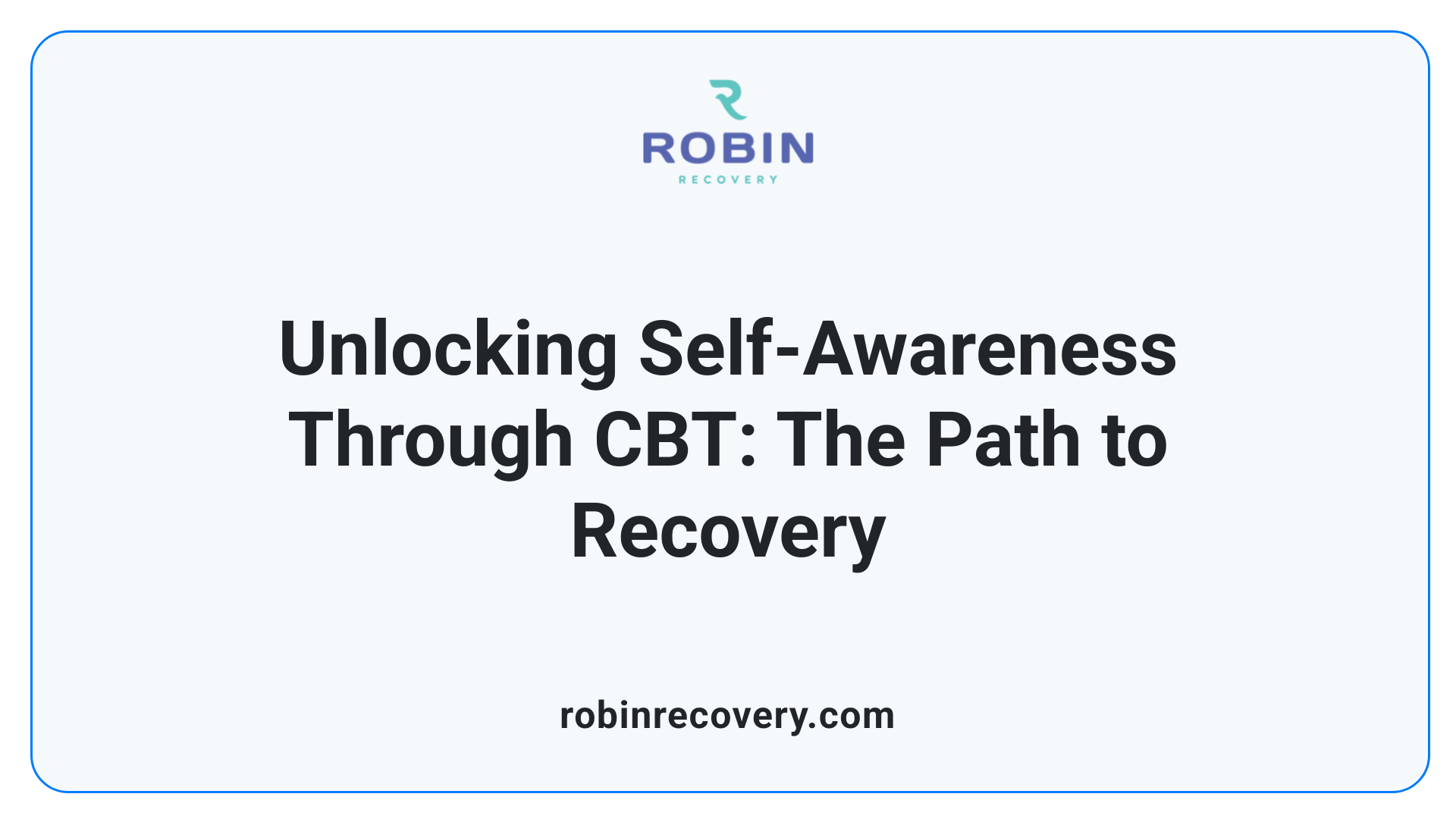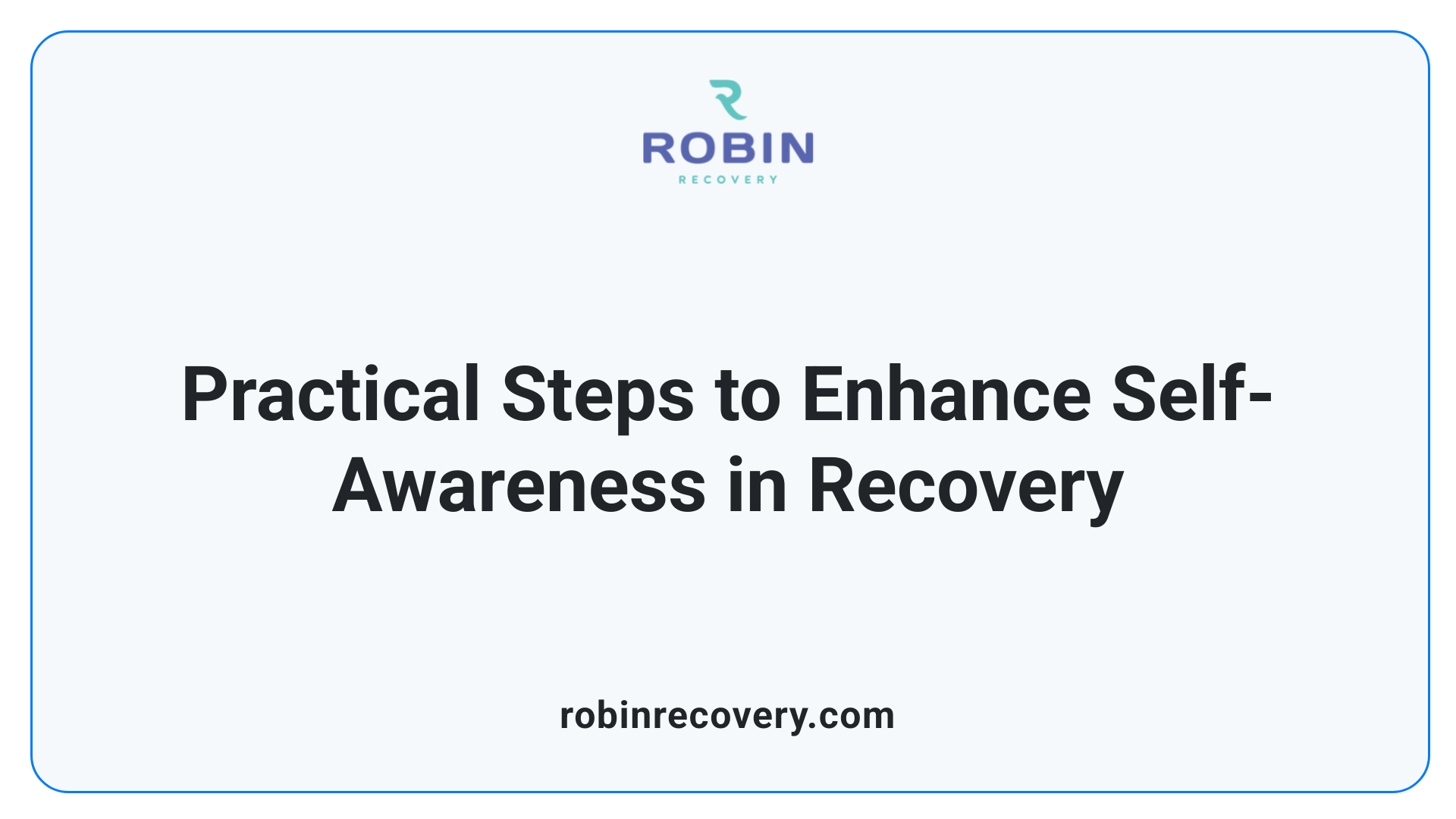How CBT Improves Self-Awareness in Recovery

Understanding the Power of Self-Awareness
Cognitive Behavioral Therapy (CBT) is a cornerstone methodology in addiction recovery. One of its critical outcomes is the enhancement of self-awareness among individuals. This heightened self-awareness acts as a catalyst in driving personal growth and stable sobriety, by fostering a deeper understanding of one’s thoughts, emotions, and behaviors.
The Role of CBT in Enhancing Self-Awareness

What role does Cognitive Behavioral Therapy (CBT) play in enhancing self-awareness during addiction recovery?
Cognitive Behavioral Therapy (CBT) plays a significant role in enhancing self-awareness during addiction recovery by helping individuals examine the connections between their thoughts, feelings, and behaviors. This therapeutic approach encourages clients to identify negative thought patterns and emotional triggers that contribute to their addictive behaviors.
By understanding these connections, individuals can develop healthier coping strategies and replace destructive behaviors with more constructive ones. CBT uses techniques such as self-reflection and emotional regulation exercises to facilitate this understanding. For example, daily journaling allows individuals to track their emotions and triggers, while mindfulness practices improve focus and emotional awareness.
Moreover, CBT promotes mindfulness and reflective practices, further enhancing self-awareness and allowing individuals to recognize their progress in recovery. Techniques such as meditation and breathing exercises help individuals stay grounded, making it easier to manage cravings and stress.
Ultimately, increased self-awareness fosters personal growth and empowers individuals to make informed choices, significantly aiding their journey towards sobriety.
Recognizing and Modifying Negative Thought Patterns with CBT

How does CBT help individuals recognize and modify negative thought patterns and behaviors?
Cognitive Behavioral Therapy (CBT) plays a vital role in helping individuals recover from addiction by focusing on the identification and modification of negative thought patterns. This process involves several key elements including the identification of irrational beliefs, the establishment of realistic thought processes, and improved emotional regulation.
- Identification of Irrational Beliefs
CBT encourages individuals to recognize self-defeating thoughts that contribute to their struggles with addiction. Through self-reflection and structured exercises, clients learn to pinpoint these harmful beliefs, creating a foundation for change. - Establishment of Realistic Thought Processes
Once irrational beliefs are identified, CBT empowers individuals to develop healthier, more constructive thought patterns. By challenging distorted thinking, clients begin to replace negativity with optimism, fostering a more positive outlook on their recovery journey. This shift is crucial for emotional stability and resilience against relapse. - Improved Emotional Regulation
As individuals learn to manage and reframe their thoughts, they also enhance their ability to regulate emotions. CBT teaches coping strategies that enable individuals to confront overwhelming feelings and resist the urge to engage in substance use. This emotional control is essential for maintaining long-term sobriety.
In summary, CBT helps individuals recognize and modify negative thought patterns and behaviors, leading to healthier decision-making and emotional well-being during recovery.
Preventing Relapse Through Self-Awareness

How does increased self-awareness help prevent relapse during the recovery process?
Increased self-awareness is crucial in preventing relapse during recovery. It enables individuals to identify and understand their emotional and environmental triggers, which can lead to substance use. Recognizing these patterns allows people to anticipate situations that may threaten their recovery and take proactive steps to navigate them.
For instance, journaling can assist individuals in tracking their emotions and identifying recurring themes. Mindfulness practices can enhance emotional regulation, fostering a clearer understanding of one’s thoughts and feelings. This knowledge equips individuals to develop healthy coping strategies that effectively replace the urge for substance use.
Moreover, individuals with greater self-awareness are likely to engage actively in support networks, reinforcing their accountability. Healthy relationships supported by improved communication skills can provide an essential buffer against stressors that lead to relapse. Enhanced self-awareness cultivates resilience, enabling individuals to manage setbacks while maintaining their commitment to sobriety.
Strategies to Prevent Relapse
- Identifying Triggers: Individuals can create a list of known triggers, such as social situations or emotional states that prompt cravings.
- Setting Boundaries: Establishing personal limits with others helps protect one’s recovery and enables open communication about needs.
- Daily Reflection: Engaging in self-reflection, through methods like journaling or mindfulness, encourages ongoing awareness of thoughts and emotions.
Importance of Support Networks
Support networks play a vital role in recovery. They provide emotional backing and accountability, encouraging individuals to share their struggles and successes. These relationships can be enriched by enhanced communication skills gained through Cognitive Behavioral Therapy (CBT).
In summary, increased self-awareness leads to improved decision-making, effective coping strategies, and stronger support networks, all vital for preventing relapse and ensuring a successful recovery journey.
Effectiveness of CBT in Treating Substance Use Disorders

How effective is CBT in treating substance use disorders, and how does it contribute to personal growth?
Cognitive Behavioral Therapy (CBT) proves to be highly effective in treating substance use disorders (SUDs) by focusing on the identification and transformation of negative thought patterns. This approach not only helps reduce substance use but also enhances self-awareness, which is crucial for long-term recovery.
CBT empowers individuals by teaching them practical coping strategies to manage cravings and emotional distress. This empowerment fosters personal growth, allowing individuals to develop resilience and improved emotional regulation skills, which are essential attributes on the road to recovery.
Further contributing to personal development, CBT employs self-reflection techniques such as journaling and mindfulness practices, enhancing self-direction and leading to healthier decision-making. By recognizing triggers and understanding their behavioral patterns, individuals are able to advocate for their needs more effectively, which is vital for maintaining sobriety.
Another significant aspect of CBT is its emphasis on building supportive relationships through improved communication skills. These connections are instrumental in creating a support network which is crucial for sustained recovery.
In summary, CBT not only facilitates the treatment of substance use disorders by addressing harmful thought patterns but also promotes personal growth through self-awareness, empowerment, and the development of positive coping mechanisms.
Practical Methods for Building Self-Awareness in Recovery

Journaling as a tool for reflection
Journaling is an effective practice for enhancing self-awareness during the recovery journey. By regularly tracking thoughts, emotions, and triggers, individuals can analyze their experiences over time. This reflective process allows for recognition of emotional highs and lows, providing insights into patterns that may indicate early signs of relapse.
Mindfulness practices
Incorporating mindfulness techniques, such as breath awareness and body scanning, further supports self-awareness. These practices help individuals focus on their feelings and physical sensations in the present moment. Mindfulness cultivates emotional regulation, making it easier to navigate cravings and stress without falling back into addictive behaviors.
Self-reflection through therapy
Cognitive Behavioral Therapy (CBT) is particularly beneficial for self-reflection. Therapy sessions focus on identifying negative thought patterns and confronting them, leading to a better understanding of personal triggers. Through structured self-reflection exercises within CBT, individuals learn to manage difficult situations and develop healthier coping strategies. The combination of these practical methods promotes deeper self-awareness as clients progress in their recovery.
CBT’s Contribution to Improved Relationships and Support Networks
How does CBT enhance communication skills?
Cognitive Behavioral Therapy (CBT) emphasizes enhanced communication skills, which play a crucial role in creating healthy relationships. Individuals learn to articulate their needs and emotions clearly, fostering mutual understanding in interactions. These skills can transform confrontations into constructive discussions, enabling individuals to express their feelings without fear of judgment.
Why is setting personal boundaries important?
Setting personal boundaries is essential for maintaining sobriety and mental health. CBT helps individuals identify their limits and communicate them effectively to others. Knowing when to say ‘no’ or to step back from stressful situations can safeguard against triggers that may lead to substance use.
How can individuals build a support network through CBT?
CBT encourages individuals to seek and build strong support networks. These networks can consist of family, friends, therapists, and support groups who provide encouragement and accountability. Enhanced self-awareness gained through CBT allows individuals to identify supportive people in their lives, fostering connections that bolster their recovery journey.
CBT AspectsBenefitsStrategies Enhanced Communication Skills Improved interactions and relationships Role-playing and communication exercises Setting Personal Boundaries Protecting emotional health Boundary-setting techniques Building a Support Network Stronger connections and accountability Identifying supportive individuals
Long-term Benefits of CBT: Resilience and Empowerment
Developing coping strategies against stressors
Cognitive Behavioral Therapy (CBT) has been instrumental in fostering effective coping strategies for individuals in recovery. These strategies are designed to manage cravings and emotional distress, which can be significant barriers to sustained sobriety. By learning to recognize triggers and developing personalized responses, individuals become better equipped to handle life's stressors without resorting to substance use.
Building resilience after setbacks
Resilience is another powerful benefit gained through CBT. The therapy not only encourages recovering individuals to face challenges but also empowers them to bounce back after setbacks. For instance, CBT techniques help individuals identify negative thought patterns linked to failures, allowing them to cultivate healthier responses. This increased resilience is essential for maintaining sobriety when confronted with stressors or potential temptations.
Promoting accountability and self-efficacy
CBT plays a critical role in promoting accountability. Through self-reflection and mindfulness practices, individuals develop a deeper understanding of their emotions and behaviors, which enhances their self-efficacy. This recognition enables them to advocate for their needs effectively, improving their chances of long-term recovery. Consequently, this blend of awareness, accountability, and resilience contributes to a healthier mindset and a commitment to sobriety.
Harnessing Self-Awareness for Sustainable Recovery
CBT not only plays a profound role in the treatment of substance use disorders but also fosters significant personal growth through heightened self-awareness. By integrating CBT principles into recovery, individuals are equipped with the tools needed for sustainable change, allowing them to not only achieve sobriety but thrive in all areas of life. Self-awareness is the bedrock of this transformation, enabling individuals to navigate the challenges of addiction recovery with resilience and confidence.
References
- Utilizing CBT Techniques for Recovery - Promises Behavioral Health
- Ultimate Guide to Self-Awareness in Recovery
- Cognitive-Behavioral Therapy for Substance Use Disorders - PMC
- How I Built Self Awareness in Recovery - Vanity Wellness Center
- Cognitive Behavioral therapy (CBT) in Addiction Treatment
- How Cognitive Behavioral Therapy Supports Addiction Recovery
- How Cognitive Behavioral Therapy (CBT ... - Faith Recovery
- Benefits of CBT for Substance Abuse | Clear Behavioral Health
- Cognitive Behavioral Therapy: A Powerful Tool for Addiction Recovery
- How Does Self-Awareness in Recovery Help Transform the Journey?
